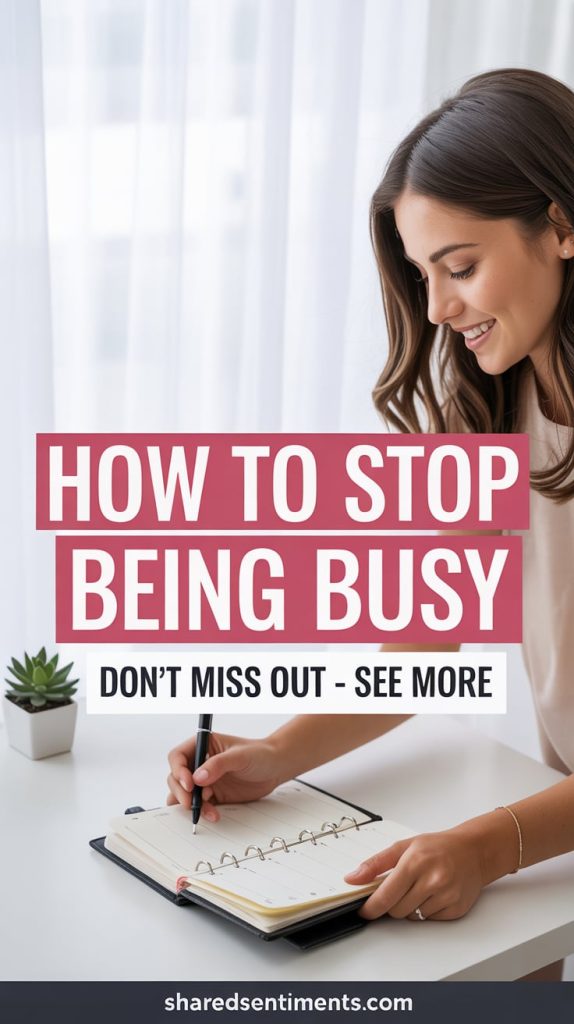How To Stop Being Busy All The Time

Have you ever noticed yourself racing through the day, moving from one task to another, always feeling short on time?
That constant rush has become normal for so many of us.
These days, being busy is seen as proof that we’re productive, successful, or even valuable.
But the truth is, busyness doesn’t always mean progress. In fact, it often works against it.
I know because I lived that way, too. I was always rushing, always stressed, and always focused on the next item on my list.
Then, in my first year of college, everything caught up to me.
My health collapsed, my relationships fell apart, and I felt more lost than I ever had before.
I ended up taking a year away from school. What seemed like a setback at first became the best decision for my well-being.
It gave me the space to finally see that learning How To Stop Being Busy was the only way to find balance again.
Don’t Miss: How To Live A Soft Life: 8 Practices To Become A Soft Lifer
1. Admit that busyness is not the same as success
For years, I treated busyness like an achievement.
The fuller my calendar, the more important I thought I was.
But the truth is, being busy doesn’t mean you’re moving forward.
It can mean you’re distracted, exhausted, and too drained to focus on what really matters.
The first step is to admit this: being busy is not the same as being successful.
That simple mindset shift makes it easier to see where change needs to happen.
2. Cut down your to-do list
I used to write long lists every morning.
By the end of the day, most of it was unfinished, and I felt like a failure.
Now, I only choose three main tasks for the day.
If I finish those, I can add more, but I don’t pressure myself to do it all at once.
Keeping the list short forces me to focus on what’s truly important instead of chasing every little thing.
It’s a small change, but it makes a huge difference.
3. Learn how to say no
I used to say yes to everything.
Extra projects.
Extra favors.
Extra plans.
I thought I was being helpful, but really I was just stretching myself too thin.
Saying no was uncomfortable at first, but it became one of the most freeing things I’ve ever learned.
Now, I remind myself that every yes takes time away from something else I care about.
Protecting my time is not selfish.
It’s necessary.
4. Stop multitasking
I thought multitasking made me efficient.
But really, it just left me scattered.
I would write emails while half-listening to a podcast, or cook dinner while texting, and in the end, everything took longer.
Now, I focus on one task at a time.
When I write, I only write.
When I eat, I only eat.
It feels slower, but the work gets done better and faster because I’m actually paying attention.
Single-tasking is one of the simplest ways to stop being busy without losing progress.
5. Protect your mornings and evenings
I used to check my phone as soon as I woke up and right before I went to sleep.
That habit kept me stuck in busyness even when I wasn’t working.
Now, I keep my mornings slow and my nights calm.
In the morning, I drink coffee without looking at emails.
At night, I wind down with a book or journaling instead of scrolling.
Protecting the start and end of my day creates space for rest, and it helps me not feel “on” all the time.
6. Take breaks without guilt
When I first started taking breaks, I felt lazy.
I thought pausing meant I wasn’t serious about my goals.
But I was wrong.
Breaks keep me from burning out.
Sometimes it’s just five minutes away from my desk, stretching or stepping outside.
Other times it’s a full afternoon off to rest.
When I return, I always feel sharper and more focused.
Rest is not wasted time.
It’s what makes real work possible.
7. Simplify your commitments
I used to fill my schedule with everything—clubs, events, side jobs, social plans.
It looked impressive on paper, but inside I was miserable.
Eventually, I asked myself what I actually cared about.
I let go of activities that didn’t match my values.
Now, my schedule is lighter, but my days are fuller in the best way.
Simplifying commitments means you spend more time doing things that matter, not just things that keep you busy.
8. Create space for stillness
I used to hate silence.
If I wasn’t listening to music, watching something, or talking to someone, I felt restless.
But once I started practicing stillness, I noticed how much calmer I became.
Sometimes that means sitting quietly with a cup of tea.
Other times it’s taking a slow walk without headphones.
Stillness lets your mind catch up with your body.
It’s one of the strongest antidotes to a busy life.
9. Disconnect from constant notifications
Every ping from my phone used to pull me away from whatever I was doing.
Emails, texts, alerts—there was always something demanding my attention.
That constant interruption kept me in a state of busyness even when I wasn’t actually working.
Now, I turn off nonessential notifications.
I check messages at set times instead of letting them control my day.
It feels strange at first, but it creates so much mental peace.
10. Redefine productivity
For most of my life, I thought productivity meant filling every hour with tasks.
But now, I see productivity differently.
It’s not about how much you do.
It’s about doing the right things with the energy you have.
Sometimes that means finishing a project.
Sometimes it means resting so I can be ready for tomorrow.
By redefining productivity, I freed myself from the trap of constant busyness.











